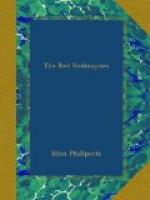Nevertheless, though things difficult and dangerous we had triumphantly achieved, before this task for a child we failed; and the reason for our collapse was not in Jenny but in me. Had I listened to my austere partner I should have waited only until she had searched for and found her uncle’s will. This she did; and as the instrument proved entirely satisfactory, my duty was then to proceed about our business and remember that better an egg to-day than a hen to-morrow. Only an artist’s fond pride intervened; nothing but my vanity, my consciousness of power to excel, upset the rightful climax. We were, indeed, both artists, but how incomparably the greater she! How severe and direct, how scornful of needless elaboration! She belonged, mind and body, to the finest period of Greek art, and echoed their stern, soulless simplicity and perfection. Had she won her way with me, we should be living now to enjoy the fruits of our accomplishment.
But though she did not win her way, yet, in defeat, her final, glorious deed was to intercept the death intended for me, that I might still live. Loyal to the last, she sacrificed herself, forgetting, in that supreme moment, how life for me without her could possess no shadow of compensation. When Jenny shook off the dust of the world, I was ready and willing to do the same. As for that future life, in which I most potently believe, since she and I have merited a like treatment, we shall share eternity together and so be in heaven, whatever the Great Contriver may desire to the contrary. Yet who shall presume to dogmatize? “There is nothing either good or bad, but thinking makes it so.” And what the Almighty Mind may be pleased to think of any human performance is for the present hidden with Him alone. He did not make the tiger to eat grass or the eagle to feed on honey.
My wife’s deeper sanity and clearer vision always inclined her to distrust our American acquaintance, Peter Ganns. From the first moment that Jenny’s eyes fell upon that fine figure of a man, she judged him to be built on a very different mental pattern from Brendon. He was no New World edition of our poor, tame Marco; and the preliminary fact that he should have anticipated us and arrived beside Como before he was expected to do so, convinced Jenny that he must prove a factor of extreme gravity in all future calculations. I, too, perceived his force of character, and rejoiced to do so, for here appeared an enemy worthy of my invention and resource.
It seemed clear that Pietro was a skeptical person—doubtless made so by his dreadful trade. “Thomas” rather than “Peter” should have been his name. He had a disconcerting habit of taking nothing for granted; and his “third eye” as he called it—an eye of the mind—saw a great many things concealed from ordinary observers. He would have made a classical criminal.




